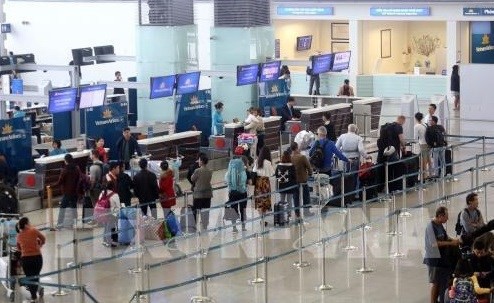
Air transportation of int’l passengers, cargo rebounds strongly in Q1
Latest
 |
| Passengers wait to handle boarding procedures at an airport in Viet Nam. (Photo: VNA) |
In a report sent to the Ministry of Transport, CAAV said Vietnamese airlines have transported an estimated 141,600 international passengers and 38,000 tonnes of international cargo in Q1, respectively soaring 441 percent and 113.9 percent year on year.
Airports nationwide handled 321,000 international passengers and 292,000 tonnes of international cargo during the period, up 176.2 percent and 21.1 percent.
Meanwhile, the carriers served about 6.5 million domestic passengers and 48,400 tonnes of domestic cargo, down 12.5 percent and 8.8 percent from a year earlier.
About 13 million domestic passengers and 98,000 tonnes of domestic cargo passed through Vietnamese airports during the three months, dropping 13.3 percent and 5 percent, respectively.
CAAV said as of March, there are 23 foreign and Vietnamese airlines operating air routes between Viet Nam and 20 countries/territories.
Compared to 2019 - before the COVID-19 pandemic broke out, regular air routes with eight foreign destinations have yet to be resumed, namely Brunei, India, Indonesia, Myanmar, Macau, Finland, Italy, and Switzerland.
Airlines are operating 67 routes to/from Viet Nam, mostly to/from Noi Bai and Tan Son Nhat international airports.
From March 15, when Viet Nam fully reopened to international tourists, to March 21, the route linking with Singapore was the busiest with 45 round-trip flights, two flights more than the previous seven days and equivalent to 36 percent of the frequency in the same period of 2019. However, the largest number of passengers, 10,300, was recorded on the route between Viet Nam and Japan, accounting for 18.1 percent of the total.
The CAAV said the Government’s Resolution No. 32/NQ-CP, issued on March 15, on visa exemption for citizens of 13 countries has contributed to the growth of international passenger and cargo transportation.
However, the CAAV also pointed out that the aviation sector is facing pressure from rising fuel prices. Some carriers have proposed relevant agencies reduce import and environmental taxes on aviation fuel as well as some types of fees.

















